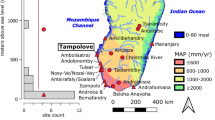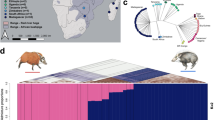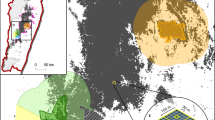Abstract
Despite significant efforts to understand and conserve Madagascar’s unique biodiversity, relatively little is known about the island’s carnivore populations. We sampled four rainforest sites to explore the effects of forest logging and fragmentation on carnivore species richness and the density of the two largest endemic carnivores, the Fossa (Cryptoprocta ferox) and Malagasy Civet (Fossa fossana). Our rainforest sites were selected across a gradient of increasing anthropogenic disturbance from primary to selectively-logged to fragmented forest < 2.5 km from primary forest, to fragmented forest > 20 km from primary forest. We deployed a minimum of 26 passive infrared camera stations at each forest site to non-invasively sample carnivores. By identifying C. ferox and F. fossana individuals based on unique pelage patterns, we were able to apply capture-recapture analyses using the Huggins model in Program MARK and Program DENSITY. We used a buffer of full mean-maximum-distance-moved (MMDM) and a spatially-explicit capture-recapture (SECR) method to estimate density. A total of 5,579 camera-trap nights yielded detections of five endemic carnivores (C. ferox, F. fossana, ring-tailed mongoose Galidia elegans, broad-striped mongoose Galidictus fasciata, small-toothed civet Eupleres goudotii). We found variation in carnivore species richness among the four sites. All endemic carnivores were present in the primary and selectively-logged rainforest, while overall endemic species richness was greatly reduced in the fragmented forests. Density also varied significantly among the rainforest sites. F. fossana density (individuals/km-2 ± SE) decreased significantly between the primary rainforest (SECR 3.19 ±0.55, MMDM 2.47 ±0.13) and selectively-logged rainforest (SECR 1.38 ± 0.223, MMDM 1.22 ± 0.055). F. fossana was absent from both fragmented sites. C. ferox density also decreased significantly between the primary rainforest (SECR 0.12 ± 0.05, MMDM 0.14 ± 0.001) and the selectively-logged rainforest (SECR 0.09 ±0.04, MMDM 0.09 ±0.002). C. ferox was absent from the fragmented rainforest > 20 km from primary forest, yet we did detect a single individual at the fragmented rainforest < 2.5 km from the primary forest. Our results suggest that forest logging and fragmentation negatively impact C. ferox and F. fossana populations in Malagasy rainforests. Unlike F. fossana, C. ferox appears to be able to occupy rainforest fragments near primary forest. Our study provides the first assessment of carnivore population parameters in the eastern rainforests of Madagascar and will be of importance to Malagasy governmental and non-governmental agencies seeking to more accurately assess the status of these species and to best set management goals.
Similar content being viewed by others
Article PDF
Author information
Authors and Affiliations
Corresponding author
Rights and permissions
About this article
Cite this article
Gerber, B., Karpanty, S. & Randrianantenaina, J. The impact of forest logging and fragmentation on the species richness and density of Malagasy rainforest carnivores. Nat Prec (2010). https://doi.org/10.1038/npre.2010.5259.1
Received:
Accepted:
Published:
DOI: https://doi.org/10.1038/npre.2010.5259.1



